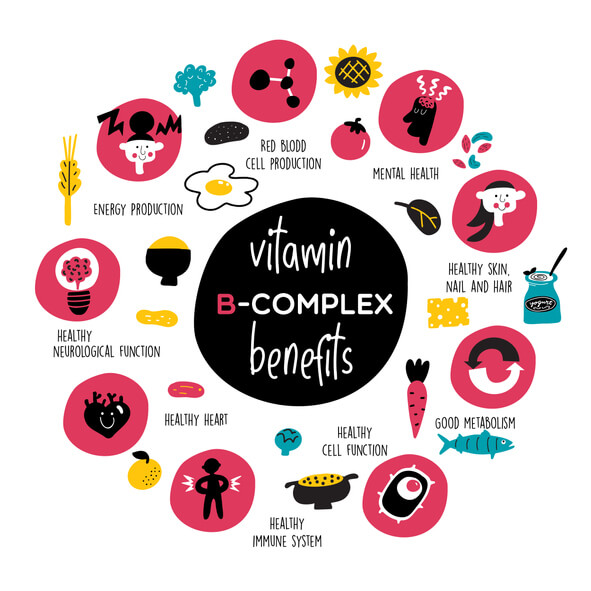Your body cannot sustain life without B vitamins, yet many people overlook suboptimal levels of these tiny-but-mighty metabolic superstars. Truthfully, even marginally low levels of B vitamins like folic acid, B6, and B12 can hinder crucial detox and immune functions. And what’s more, almost half of all people aren’t able to use certain B vitamins effectively–a fact that’s seldom talked about in conventional medicine.
In a moment you’ll understand why B vitamins should have a permanent spot in your go-to routine to keep you feeling and looking your best. Let’s dive in!
The Powerhouse Nutrient You’re Likely Missing

B vitamins are the tiny but complex nutrients your body absolutely cannot live without. And even though B vitamins are a family of nutrients, each B vitamin is unique, and definitely deserves a spotlight of its own.
B vitamins are involved in almost every metabolic process your body performs. Your brain, heart, nervous system, and liver couldn’t function without them. What’s more, they also help turn the food you eat into energy, and repair DNA.
About 40% of the population has a genetic anomaly that hinders the absorption and function of certain types of B vitamins (1). For this reason, getting plenty of B vitamins–and the right types–is especially important to maintain detox function and overall health.
Browse coenzymated B vitamins in the shop>>>
B Vitamin Function – What do B vitamins do?
B vitamins have so many important jobs in the body—they convert calories into cellular energy, they help build and maintain DNA, some maintain healthy skin, others build neurotransmitters that promote a stable mood, and they keep your nervous system functioning (2).
Each B vitamin is unique, but they work closely together to perform critical functions for optimal brain and body health.
They are a family of vitamins that include:
- Thiamin (B1)
- Riboflavin (B2)
- Niacin (B3)
- Pantothenic acid (B5)
- Pyridoxine (B6)
- Biotin (B7)
- Folate (B9)
- Cobalamin (B12)
- Choline and inositol
B vitamins are also required for proper methylation, a biochemical process that is responsible for detoxification, immune function, healthy mood, controlling inflammation, and more. More on what you need to know about how this process affects B vitamins in a moment. Let’s take a deeper look at some of the ways the B vitamins can support your health.
Related: 8 Reasons to Consider IV Therapy
Neurological Health and Dementia
B vitamins are crucial to allow nerves to send and receive messages via electrical impulses. They play a role in building and maintaining the protective, insulation-like covering called the myelin sheath (3). If this protective covering deteriorates, it can lead to muscle weakness, vision loss, pain, and neurological disease.
Folate, B12, and B6 also keep levels of an inflammatory protein in check, called homocysteine. This is important because high levels of homocysteine are associated with a greater risk of dementia and Alzheimer’s disease (3).
Read more: New Clues About Alzheimer’s Risk
Mental Health and Mood
Every B vitamin has a role to play in keeping your mood stable and your head clear. In fact, B vitamins are so important for normal brain function that they all have special shuttle mechanisms to get them across the blood-brain barrier.
B vitamins are required to make neurotransmitters like GABA, dopamine, and serotonin, in addition to S-adenosylmethionine (SAMe)–all of which play a role in a healthy mood.
Thiamin (B1) is required to make acetylcholine, a master neurotransmitter that plays a role in everything from learning and memory to regulating heart rate. Low levels of thiamin are also common in cases of Alzheimer’s.
Some researchers suggest a B12 deficiency may be one overlooked factor in mental health issues such as depression and anxiety. Studies show that those with depression tend to have low levels of both B12 and folate (3).
Jitter-free Energy

If you’re one of the millions of people reaching for that third cup of coffee halfway through your day, you’re likely low in B vitamins that help sustain energy production all day long.
One or more of the B vitamins are involved in every single aspect of generating cellular energy—including in the brain—and a deficiency in any of them will negatively affect mitochondrial health and function and normal energy production.
Is a B12 energy boost right for you? Learn more about IV therapy!
Detoxification
Healthy detoxification in your body relies on a little-known process called methylation, and in an increasingly toxic world, supporting this biochemical process is very important to wellbeing and longevity.
Methylation–and therefore detoxification–are dependent on the B vitamins to work properly (4). This process helps your liver and other detox organs convert and excrete unwanted toxins from your body.
The B vitamins are also necessary to make glutathione, your body’s most powerful antioxidant.
Scientists in Toronto investigated the effects of B vitamin supplementation in subjects exposed to air pollution. They found that four weeks of supplementation with vitamins B6, B12, and folic acid reduced epigenetic damage caused by air pollution (5). This may be due to their ability to increase glutathione production.
Increase your glutathione levels with a glutathione push. Learn more!
Genetic Variations Inhibit Certain B Vitamins
As much as 40% of the population have a change–often referred to as a variant–in their DNA that restricts how the body is able to use B vitamins. This genetic variation is commonly referred to as MTHFR, and it stands for methylenetetrahydrofolate reductase.
This small variation in DNA affects detoxification, glutathione production, cognitive health, immune function, and many more systems in the body.
MTHFR may also affect how you react to drugs, repair of DNA, and the formation of blood cells that fight infection, or how well they build neurotransmitters like serotonin or dopamine.
Some people may have no symptoms of an MTHFR variant at all, while others may have serious complications like increased risk for heart disease, sluggish detox, miscarriages, and more. Children may be at a more increased risk for ADHD, learning disabilities, autism, or autoimmune disorders. MTHFR is an inherited genetic variation, although just because you inherit the variant, doesn’t mean you’ll experience health issues.
How can you find out if you have this gene?
- ALCAT Food Sensitivity Test
- GeneSight
- DDI Methylation Profile
Read more: What is MTHFR and what can you do about it?
Signs + Symptoms of Vitamin B Deficiency
What causes a vitamin B deficiency and how can you spot it? B vitamin deficiencies can occur when:
You aren’t getting enough B vitamins in your diet.
Your digestive system can’t absorb (or use) B vitamins.
You’re on medication that prevents absorption, function, or utilization of B12 or other B vitamins.
Are you at risk for a B vitamin deficiency?
There are many causes for vitamin B deficiency. Surprisingly, some of them are practices often undertaken to improve health. Common risks for vitamin B deficiency include:
- Vegetarian or vegan diets – Plants don’t make vitamin B12. The only foods that deliver it are meat, eggs, poultry, dairy products, and other foods from animals. Strict vegetarians and vegans are at high risk for developing a B12 deficiency.
- Long-term use of acid-lowering medications – Acid is needed to absorb vitamin B12 in the intestines. The condition is more likely to occur in older people due to the cutback in stomach acid production that often occurs with aging.
- Celiac or Crohn’s disease – Gastrointestinal disorders can interfere with absorption of B vitamins.
- MTHFR variant – Genetic variants hinder the use of B vitamins like folic acid, B12, and B6.
Who Should Test B Vitamins?
Symptoms associated with B vitamin deficiencies can be nonspecific, especially with mild to moderate deficiencies. But even marginally reduced
status of some B vitamins can result in side effects like brain fog, fatigue, and muscle weakness. If any of the following applies to you, you should consider speaking with your integrative medicine doctor about functional testing for various B vitamins.
Long-term use of PPI medication or acid-lowering drugs
- Symptoms, such as numbness, tingling, difficulty with walking or balance issues
- Anemia
- Changes in mental status, confusion, or disorientation
- Dementia or Alzheimer’s disease
- Gastrointestinal disorders or malabsorption
- Eating a vegan or vegetarian diet
- Anyone over age 60 years old
- Autoimmune disorders
- Children with autism spectrum disorders or developmental delay
- Eating disorders
- History of heart attack, stroke, or blood clots
Evaluate your vitamin B status. Scheduling an appointment is fast and easy.
Common Tests for B Vitamins

Your integrative medicine doctor will evaluate your individual risk factors and work with you to determine appropriate testing for B vitamin levels. Common tests include (6):
- Serum B12
- Methylmalonic acid
- Homocysteine
- Complete blood counts
- Biotin in blood
- B12 and folate
- PLP in blood
- Pantothenic acid in blood or urine
- Niacin and metabolites in blood or urine
How You Can Get More B Vitamins
B vitamins are found in many foods, though most Americans struggle to get an adequate intake of B12, folic acid, and B6 if not for the fortification of processed foods.
Whole-food sources of B vitamins include:
- Minimally processed whole-grains
- Animal products like meat, seafood, eggs, and dairy
- Beans and legumes like lentils and chickpeas
- Nuts and seeds
- Leafy green vegetables like spinach, chard, and kale
- Fruits like avocado and bananas
Vitamin B12 specifically can be found in significant quantities in animal products, including red meat, organ meats, poultry, fish & seafood, eggs, and dairy products.
Vitamin B Complex Supplements
It’s always a better choice to get your nutrients from food, but if you decide a vitamin B supplement is right for you, there are some important things to keep in mind to help you choose the right product.
Look for “active” forms – biologically active B vitamins contain coenzymated forms of these nutrients that bypass slow conversion processes in the liver and are metabolically “ready” for your body to use (7).
Browse Fully-Methylated B Vitamins>>>
Keep an eye on dosages – A super high intake of B vitamins can be harmful. Especially if you’re taking multiple supplements, make sure you’re not exceeding your intended targets for B vitamins (as well as other nutrients that may have deleterious effects at higher dosages).
IV Therapy
IV therapy is an increasingly popular way to optimize micronutrient delivery via direct intravenous methods. IV therapy delivers B vitamins and other nutrients directly to the cells that need them, bypassing first-pass digestion.
This therapy is especially useful for those who experience any malabsorption or gastrointestinal issues such as Celiac, Crohn’s disease, or IBS.
Support energy and cellular health with:
- Active B Complex Injection
- Super B Complex Injection
Explore IV therapy packages unique to CentreSpringMD
Integrative Medicine Puts You in Control
B vitamins are one big way you can maximize whole-body health. These metabolic powerhouses play a role in almost every system, helping to detoxify, repair DNA, boost immune function, and more.
Various genetic and environmental changes mean you may not be getting enough of these important micronutrients, but integrative medicine can help you develop functional solutions to optimize these nutrients.
Resources:
- https://pubmed.ncbi.nlm.nih.gov/30061759/
- https://www.medicalnewstoday.com/articles/325292
- https://www.ncbi.nlm.nih.gov/pmc/articles/PMC6930825/
- https://www.ncbi.nlm.nih.gov/pmc/articles/PMC4488002/
- https://pharmaceutical-journal.com/article/news/vitamin-b-may-help-reduce-impact-of-air-pollution-on-health
- https://medlineplus.gov/lab-tests/vitamin-b-test/
- https://www.ncbi.nlm.nih.gov/pmc/articles/PMC4772032/

